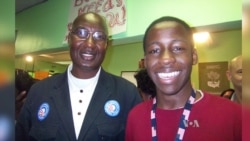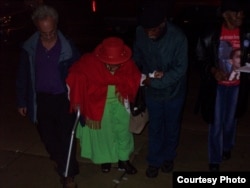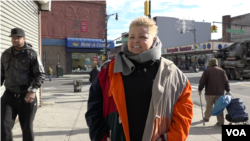Bakary Tandia remembers voting for just the second time in a U.S. general election. It was 2008, and President Barack Obama was on the ballot. After voting in New York, he drove to Pennsylvania — a swing state — to mobilize others.
He thinks back to that historic year, and one voter in particular comes to mind — an elderly African-American woman, too feeble to walk and who lacked transportation. Along with other volunteers, Tandia carried her to the polling station that night, so she could cast her vote.
“She was singing ‘Hallelujah, Hallelujah,’” recalls Tandia. “ I don’t have enough words to describe her feelings and the impact of her feelings on us.”
Source of power
Tandia came to the U.S. in 1992 to combat racial discrimination and slavery in his native West African nation, Mauritania, after it had become too dangerous to continue his work domestically. His work in human rights, he says, continues to define him today, and extends to other issues, including advocacy for immigrant rights in New York.
Since becoming a U.S. citizen in 2004, Tandia has never missed a vote — national or local. He says that for him, citizenship represents much more than just a passport: it’s a source of power, enabling him to use his voice.
As for those who feel disenfranchised, Tandia’s message is simple: everyone has a role to play, and all roles are important.
“In the communities, what happens is people tend to assume that, ‘I don’t count.’ You count, except if you count yourself out,” he said.
Tandia’s choice: Hillary
Tandia votes Democrat. The party’s agenda, he says, is more favorable to immigrants — a fundamental issue for him, closely tied to his progressive agenda on human rights.
There is no doubt, he says, that he will vote for former Secretary of State Hillary Clinton in the upcoming primary election. In his words, it is a matter of “being realistic.” He believes both Clinton and Vermont Senator Bernie Sanders have similar agendas, and therefore wants to vote for the candidate he sees as better positioned to win the general election.
In addition, he thinks it’s time for a woman to be president in the U.S., a feat he says is long overdue for a country “claiming to be the leader of human rights around the world.”
Tandia describes Clinton as experienced, competent and charismatic.
“How long will the United States be waiting for another charismatic woman who will be in a position to win general elections?” Tandia said. “For me this is an opportunity to break this cycle.”
Mixed identity
Unlike Tandia, Amanda Lugg first came to the U.S. under rather favorable conditions. It was the 1980s and she was trying to decide what to do with her life. Like Tandia, she found a job she loved, working among immigrant communities, and everything fell into place.
But Lugg’s is a story of mixed identity and discrimination as an immigrant in the U.S. She was born in London to a Ugandan father and white English mother, and adopted as a four-week-old baby. Her British accent, she says, has served her well. But people are often stunned when they see her for the first time.
“I used to say that some of my best work is done on the phone,” Lugg joked. “They’re imagining Kate Winslet walking into the room, and then it’s me. We don’t look that much alike.”
As Lugg became more politically active in the U.S., she decided to listen to her conscience and become a citizen, despite soaring costs. She felt it was important in terms of maintaining her personal safety, in case she were ever arrested for civil disobedience — an act that could otherwise result in deportation.
Lugg officially gained citizenship in August 2014, just in time for the Fall local elections in New York. Until that moment, she says she hadn’t realized the vital importance of her vote — particularly as a liberal, residing in a heavily democratic state.
“Unlike countries where perhaps many new immigrants come [from], the president cannot make decisions on his or her own, it has to come through the agreement of Congress,” Lugg said. She strongly encourages new immigrants to become politically engaged — in particular among emerging African diaspora communities — referencing a popular expression to sum up her feelings: “If you’re not at the table, you’re on the menu.”
Lugg’s choice: Bernie
Lugg does not like any of the Republican presidential candidates, and says the rhetoric against Muslims in the country has gone “off the rails.”
“I’m embarrassed to go home because I know what friends and family will be saying to me: ‘What the hell? Why would you want to stay in this country,’” she said.
Lugg says Donald Trump and other Republican contenders are responsible for a growing anti-immigration sentiment around the country, calling it a “black-and-white” race issue.
“People say, yeah, what about Ben Carson?,” she asks herself, referring to the lone African-American candidate in the 2016 election, a Republican who said in September that he "would not advocate that we put a Muslim in charge of this nation.”
She rolls her eyes emphatically, shaking her head.
“I don’t know how to explain Ben Carson," she said. "How can someone be so smart, and yet so stupid? You’re a neurosurgeon for God’s sake.”
Lugg favors Democrat Bernie Sanders for president, even though she’s not convinced he’ll win the Democratic nod. She says his policies support the working-class and “those without who strive for more.”
Lugg looks forward to her first general election as a U.S. citizen, and first vote in any national election since 1979, a year she voted for former prime minister and leader of the U.K.’s Conservative Party Margaret Thatcher.
“It was her first time in, I didn’t know,” she laughs, defensively. “My parents were conservative. She was a woman. I thought, ‘that’s cool!’”
Lugg says she is determined to “get it right” this time.








